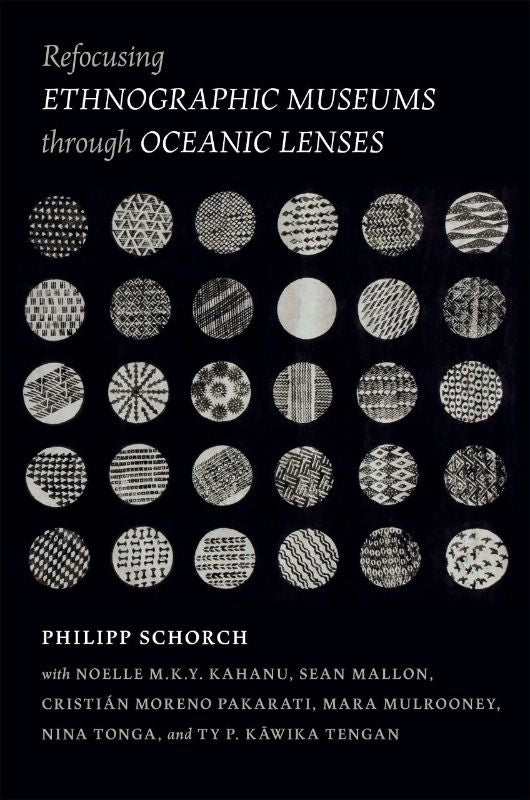SKU:
PR622863
Refocusing Ethnographic Museums through Oceanic Lenses
$49.95
Unit price
/
Unavailable
Explore the transformative approach of Refocusing Ethnographic Museums through Oceanic Lenses, an essential read for museum professionals and scholars alike. This groundbreaking work by Philipp Schorch takes you on a collaborative ethnographic journey through three influential Pacific museums located within the Polynesian triangle: the Bernice Pauahi Bishop Museum in Hawai‘i, the Museum of New Zealand Te Papa Tongarewa, and the Museo Antropológico Padre Sebastián Englert in Rapa Nui. Delve into Indigenous museum practices that challenge Euro-Americentric narratives and academic perspectives. This insightful book addresses the powerful (post)colonial renegotiations within former European and American colonies that have propelled Indigenous epistemologies to the forefront of museum studies. Refocusing Ethnographic Museums enriches the dialogue between traditional anthropological frameworks and Oceanic perspectives, offering readers a historically informed understanding of Indigenous museologies. With 264 pages of rich content formatted in a convenient paperback, this book is your gateway to understanding how to rethink and reshape ethnographic practices through Indigenous Oceanic lenses. Ideal for anyone involved in museum studies, cultural representation, and Indigenous methodologies, this volume is not just a book—it's a crucial resource in confronting coloniality as an epistemological challenge. Elevate your understanding of Pacific collections and Indigenous knowledge systems today.
Author: PHILIPP SCHORCH Publisher: Otago University Press
Bind: paperback
Dimensions: 150 x 230 mm
Pages: 264
Refocusing Ethnographic Museums through Oceanic Lenses offers a collaborative ethnographic investigation of Indigenous museum practices in three Pacific museums located at the corners of the so-called Polynesian triangle: Bernice Pauahi Bishop Museum, Hawaiâ€i; Museum of New Zealand Te Papa Tongarewa; and Museo AntropolĂłgico Padre Sebastián Englert, Rapa Nui. Since their inception, ethnographic museums have influenced academic and public imaginations of other cultural-geographic regions and as a result, Euro-Americentric projection of anthropological imaginations has come under intense pressure. At the same time, (post)colonial renegotiations in former European and American colonies have initiated dramatic changes to anthropological approaches through Indigenous museum practices. This book shapes a dialogue between Euro-Americentric myopia and Oceanic perspectives by offering historically informed, ethnographic insights into Indigenous museum practices grounded in Indigenous epistemologies, ontologies and cosmologies. In doing so, the book employs Oceanic lenses that help to reframe Pacific collections in, and the production of public understandings through, ethnographic museums in Europe and the Americas. Following this line of reasoning, Refocusing Ethnographic Museums sets out to offer insights into Indigenous museologies across Oceania to recalibrate ethnographic museums, collections and practices through Indigenous Oceanic approaches and perspectives. This, in turn, should assist any museum scholar and professional in rethinking and redoing their respective institutional settings, intellectual frameworks and museum processes when dealing with Oceanic affairs; and, more broadly, in doing the â€epistemic work’ needed to confront â€coloniality’, not only as a political problem or ethical obligation but â€as an epistemology, as a politics of knowledge’.
Author: PHILIPP SCHORCH Publisher: Otago University Press
Bind: paperback
Dimensions: 150 x 230 mm
Pages: 264
Refocusing Ethnographic Museums through Oceanic Lenses offers a collaborative ethnographic investigation of Indigenous museum practices in three Pacific museums located at the corners of the so-called Polynesian triangle: Bernice Pauahi Bishop Museum, Hawaiâ€i; Museum of New Zealand Te Papa Tongarewa; and Museo AntropolĂłgico Padre Sebastián Englert, Rapa Nui. Since their inception, ethnographic museums have influenced academic and public imaginations of other cultural-geographic regions and as a result, Euro-Americentric projection of anthropological imaginations has come under intense pressure. At the same time, (post)colonial renegotiations in former European and American colonies have initiated dramatic changes to anthropological approaches through Indigenous museum practices. This book shapes a dialogue between Euro-Americentric myopia and Oceanic perspectives by offering historically informed, ethnographic insights into Indigenous museum practices grounded in Indigenous epistemologies, ontologies and cosmologies. In doing so, the book employs Oceanic lenses that help to reframe Pacific collections in, and the production of public understandings through, ethnographic museums in Europe and the Americas. Following this line of reasoning, Refocusing Ethnographic Museums sets out to offer insights into Indigenous museologies across Oceania to recalibrate ethnographic museums, collections and practices through Indigenous Oceanic approaches and perspectives. This, in turn, should assist any museum scholar and professional in rethinking and redoing their respective institutional settings, intellectual frameworks and museum processes when dealing with Oceanic affairs; and, more broadly, in doing the â€epistemic work’ needed to confront â€coloniality’, not only as a political problem or ethical obligation but â€as an epistemology, as a politics of knowledge’.
Delivery Information
Delivery Information
All of our products are stocked in New Zealand, and shipped from our Auckland warehouse, this means no unexpected import fees or taxes.
Payment & Security
Payment methods
Your payment information is processed securely. We do not store credit card details nor have access to your credit card information.


